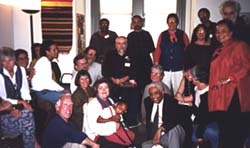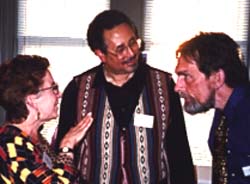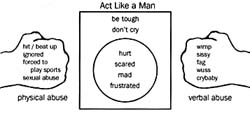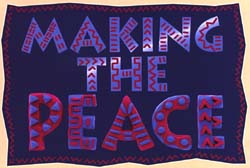| How To Stop “Acting Like A Man”
Domestic violence kill approximately 4,000 women nationally each year. It is the #1 killer of women -- more threatening than robbery, drugs, or any other crime against females. The majority of these crimes are committed by an intimate male partner. In California, approximately $30 million has been earmarked for domestic violence law enforcement and women's shelters. None of these funds have been designated to support batterers counseling. A young boy, perhaps ten years old, is home after school, watching television, when his father storms into the room. The man, imposing in his anger, faces his son. "Shut the damn TV off," he commands. "Your room is a mess -- why don't you ever clean up your room?" "Dad, can I just finish this program?" the boy quietly asks, trying not to provoke more wrath. "I promise, I'll clean it up." Unsatisfied, the man pulls a piece of paper from his pocket and pushes it in his son's face. "This is your report card, right?" the father challenges. "What is this next to math -- it's a "D" right?" "Yeah Dad, I know, I'm sorry." "Do you know what "D" stands for? Dummy!" The tension is palpable. "Dad, I did the best I could," the boy pleads," but I don't understand it." He begins to cry. "Why are you crying?" the man sneers. "You're a wimp. You're a sissy. You're a momma's boy." He pushes his young son down and stares the shaking youth in the eye. "When are you going to grow up and start acting like a man?" the father demands. End of role play. Robert Allen is describing a typical exercise used by the Oakland Men's Project to illustrate a situation of domestic abuse. "We don't come in and lecture," Allen said. "We do role plays that people can identify with, because very often they've either been in that situation, or they've seen it." The Oakland Men's Project is a non-profit, community-based violence prevention program began in1979. It began as a small group of men seeking to support the growing coalition of rape crisis centers and battered women's shelters, but has grown into a training center for men of all ages, working with groups and individuals to address the issues of how violence is socialized into American culture. Allen, a renowned writer, activist and teacher is on the board of directors for the organization. He is the author of “The Port Chicago Mutiny,” about a group of young African American sailors convicted of mutiny during World War II, and the co-editor of “Brotherman: The Odyssey of Black Men in America,” a 1995 American Book Award winner. He is also the senior editor ofThe Black Scholar, a prominent journal of Black thought . Allen is also a former abuser who believes it is important for people who have survived or witnessed domestic violence to "break through the silence" of shame. "The premise of our workshops is that the male socialization in American culture trains men to accept violence as normal," Allen said. "And in particular, violence against women and children as being o.k., and even an expression of manliness." "The thing about violence is that it is about power and control. It's not just because men are vicious. It's about maintaining control over other human beings with the notion that the use of violence in obtaining that control is acceptable." Working from a restored Victorian-style home within Oakland's historical Preservation Park, the Oakland Men's Project takes their mission out into the community -- everywhere from schools to prisons to shelters. They also conduct training sessions with social workers, nurses, counselors, physicians, attorneys, parole officers and the police. "Where we are fundamentally challenged," said Allen, "is in the culture at large. And a construction of manhood that says (violence) is acceptable is in itself a problem. And since our premise is that this is a general thing in American culture, as far as we're concerned, all men and boys are at risk for becoming perpetrators of violence." Allen said the "father-son" role play is particularly effective in teaching adolescents and young men. When we stop doing the role play the first thing we ask the boys in the room is how they felt watching this," Allen said. "Because one of the things that happens when you go through this experience is you never talk about it.” "Every boy has that feeling, but they think they're the only one," said Allen. The leaders then ask the boys what they learned in the role play about "being a man." The lessons pour out of the young participants with ease. You got to be tough. You got to be confident. You got to get your shit together. You got to be in charge. It's o.k. to mess up with somebody when they mess up first. Don't cry. Don't show your feelings. "It's about socialization...but we never use that language," said Allen. Through their training, the leaders try to show that the socialization not only sets men up to act in a violent manner, but it also trains them to shut down emotionally. "They become unable to express feelings of tenderness, feelings of hurt, grief, pain and so on," said Allen. "All of those feelings either get blocked out of our consciousness -- they're considered feminine, shameful emotions -- or they get channeled into anger." Allen points out that anger manifests itself in emotional violence as well as physical. A raised voice. Disrespect. Manipulation. Even something like fast or reckless driving can often be traced to a violent impulse. Another powerful tool of the Oakland Men's Project is working with training participants to draw a chart depicting the various power structures in society. Adults over kids. Men over women. Whites over minorities. Rich over poor. Heterosexuals over homosexuals. Bosses over workers. After it's drawn, the group discusses how violence and manipulation is used -- sometimes subtly imposed through desires of acceptance and respect -- to maintain control in these power struggles. "We try and connect these issues," said Allen. "We need to look at violence not only from a personal standpoint, but also from a social perspective...and work for some kind of change." During the training sessions, all of the feelings from the role play, as well as the misconceptions about how to "act like a man," are also written down. Eventually the leader draws a box around all the words. "We do things that help them understand the costs of being in the box," said Allen. "In terms of the kinds of behavior it leads us to perpetuate." Teaching men to recognize the signs of anger and the stages in which they are ready to act out in violence is another step in the center's training. "Recognizing that you have a choice," said Allen. "You can't attempt to evade responsibility by saying 'I just lost control." "We can work with batterers and help them identify -- at every step of the way -- the violent decisions they made," he continued. "A common example is the decision not to hit in the face, but to hit someplace on the body of a woman, where it won't show. Batterers know that. That means (the batterer) made a decision." The Oakland Men's Project also conducts their outreach through several books designed to help parents, teachers and youth workers to guide adolescents around the traps that lead to violence. “Making The Peace” was released in May of this year, providing a 15-session curriculum to help teach kids how to turn away from competition and work towards cooperation. Written by the OMP's co-founders, Allan Creighton and Paul Kivel, this book, as well as their two prior releases, “Days of Respect” and “Helping Teens Stop The Violence”, draw from the organization's 18 years of experience. Through their efforts, Allen and the other leaders in the Oakland Men's Project hope to not only teach men to recognize the socialization of violence that confines them, but also encourage them "to step out of the box." |
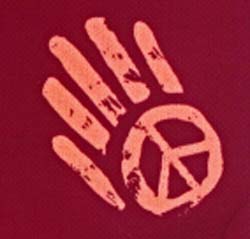 From “Making The Peace”, courtesy of Hunter House Publishers, Alameda CA
Robert Allen (center) and Allan Creighton of the Oakland Men's Project talk to a female supporter at a recent event celebrating the release of the organization's latest violence prevention guide, “Making The Peace.”
“Abusive Power and
Control Tactics in Relationships"
“The Profile of
Abuse”
|
